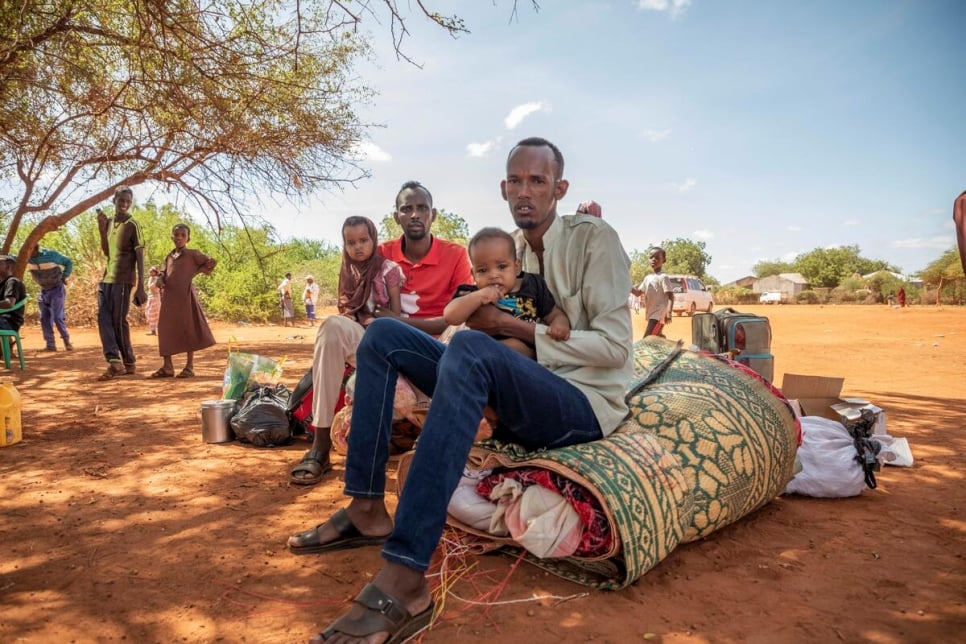UNHCR helps displaced families find a home in Somalia's Puntland
UNHCR helps displaced families find a home in Somalia's Puntland

BOSSASO, Somalia, January 31 (UNHCR) - The UN refugee agency is taking part in an ambitious pilot programme to settle 120 internally displaced families in this northern Somalia port with the cooperation of the local community. The scheme will also benefit a further 30 poor families from Bossaso.
Located on the Gulf of Aden coast of the self-declared state of Puntland, Bossaso has become a haven for up to 30,000 fugitives from the conflict in southern and central Somalia. But life is grim for the poverty-stricken IDPs (internally displaced people), who gather in crowded shanty towns on the outskirts of Bossaso.
They live in lean-to shelters made of highly flammable rags, sticks and cardboard, while the settlements lack adequate education and health facilities, including latrines, despite efforts by UN agencies and aid organisations to meet the needs of a constantly growing population. This absence of latrines puts women at risk of sexual abuse because they must go outside the settlements.
Meanwhile, garbage piles up and creates a health hazard. "Even if we have piled most of it outside our settlement, the municipality has failed to collect it so far," a young mother said as her barefoot child stumbled in the waste.
But there is hope. UNHCR is taking part with the Dutch Refugee Council and five other UN agencies - UN Habitat, the UN Development Programme, the UN Children's Fund, the World Food Programme and the UN Office for the Coordination of Humanitarian Affairs - in a project aimed at resettling 120 of the displaced families and 30 local families on their own plot of land in Bossaso. About 900 people will benefit.
And they are doing it with the help of the local community. In 2005, several local landowners agreed to donate land for the project. Plots have been demarcated and families from four IDP settlements that have housed particularly vulnerable families for a long time will be picked to pilot the programme.
The four settlements have appointed selection committees to draw up a list of eligible families - each must have been living in Bossaso for at least five years, have more than three children and own no land in Puntland. In each settlement, 30 families meeting these criteria will win the right to have their own plot of land. A town committee will pick the 30 local families to be given plots of land.
A UNHCR team has been monitoring the process to help ensure transparency and avoid arguments, but there will inevitably be disappointment for some when the results are announced in the coming weeks. "It is hard to explain to people that only 30 families will receive a plot of land," said a representative of the displaced people in one settlement.
The 2,500 residents of his settlement fled south-central Somalia in 1991 and most do not want to go back. "All the IDPs are needy, so all of us would like to have our own home immediately", he said.
To get them started, the UN agencies will give each of the 120 lucky families a shelter kit and material to build the first room of their new home. A wall will be built around each group of 30-40 home plots to provide protection, while water outlets and latrines will also be provided. The UN agencies also plan to build a police station and school for each of the new communities.
The project will not only benefit the IDPs, but also the whole municipality. Roads will be built in the underdeveloped east of the town, where the plots are located, while UNHCR and Habitat are providing funding solar-powered lighting. The building work has already begun.
While only 120 families will benefit from the current programme, others in all 16 of Bossaso's IDP settlements will be following the process with interest and hope. UNHCR and other participants in the scheme would like to continue the project in the future, but this will be subject to availability of land and funds.
"We are happy for those who will be given a plot of land, because they are our brothers and sisters," said a spokesperson for residents of the 55 Bush settlement, whose 400 IDPs fled south-central Somalia in 2000. "We do hope that, God willing, we will be next, because we really need it," she added.
Her views are shared by thousands of others here in Bossaso.
By Catherine Weibel in Bossaso, Somalia









